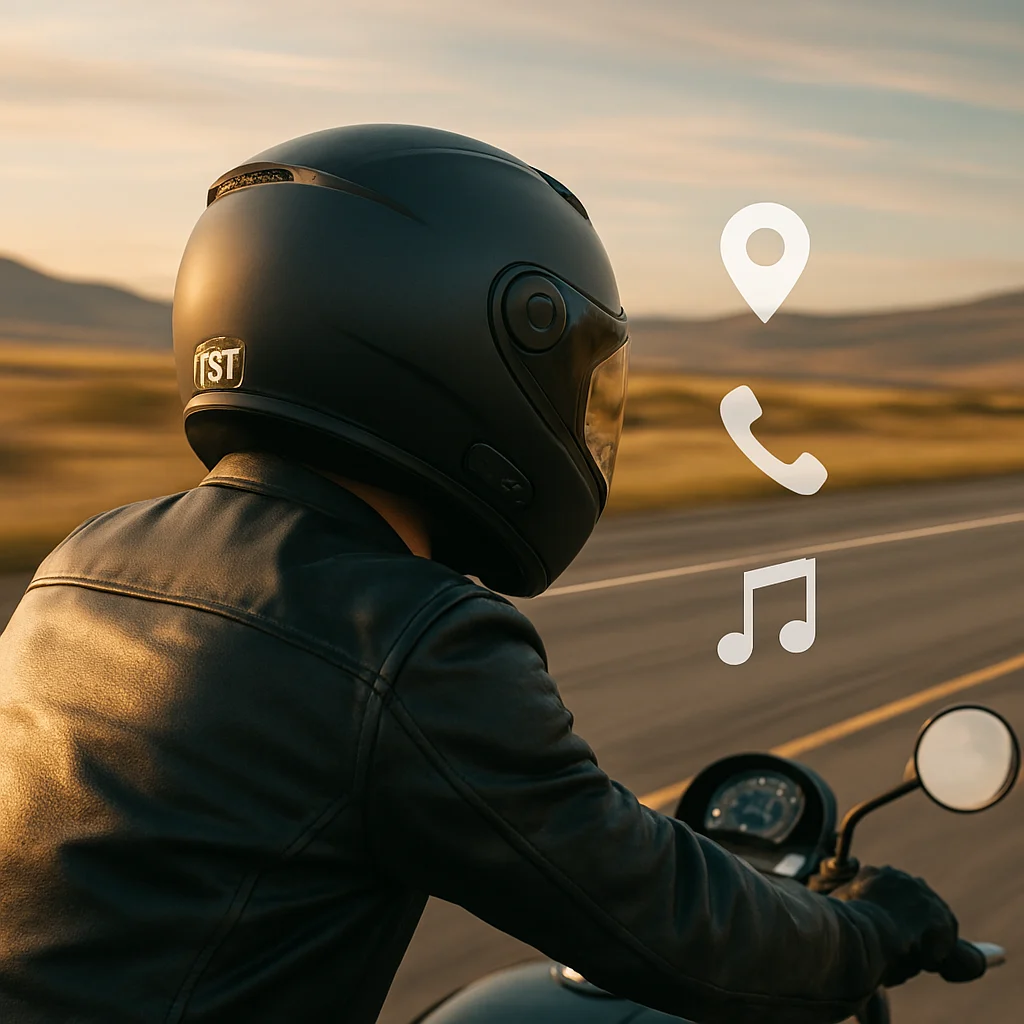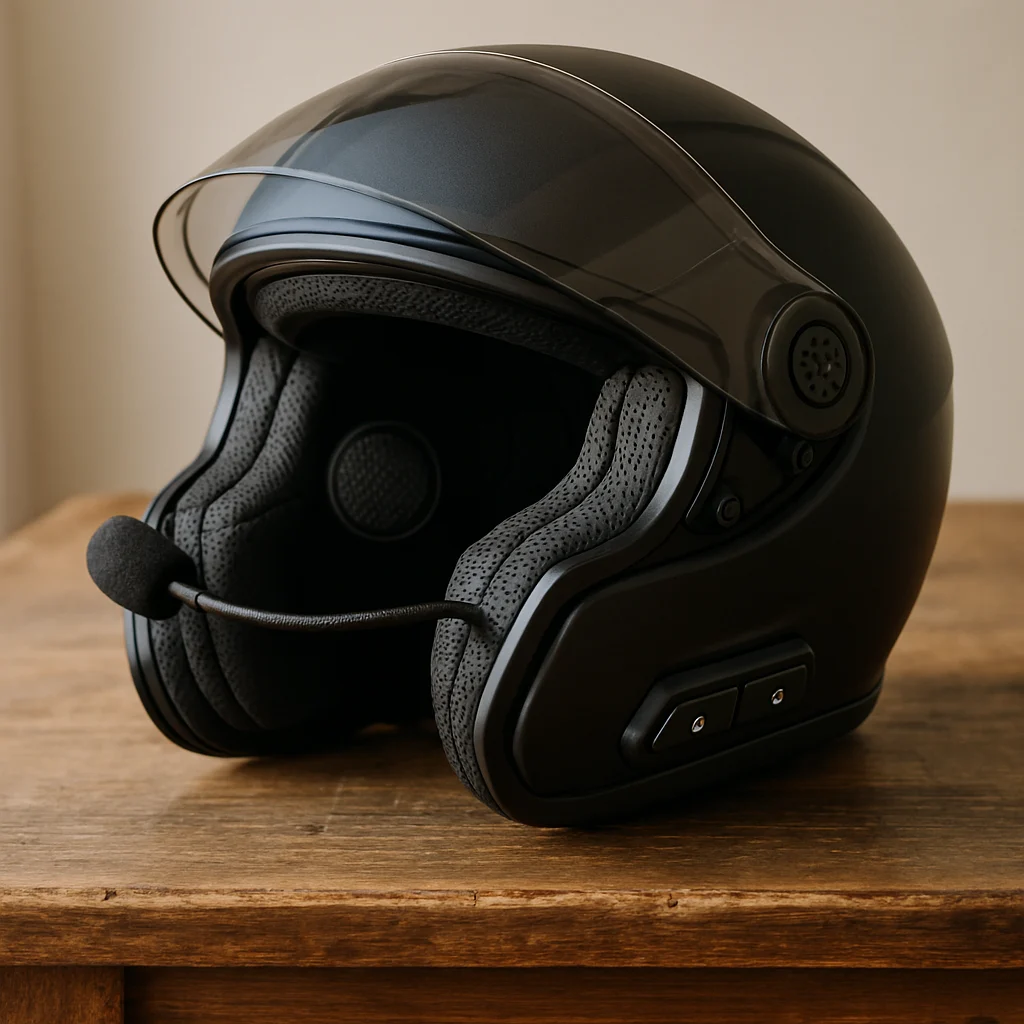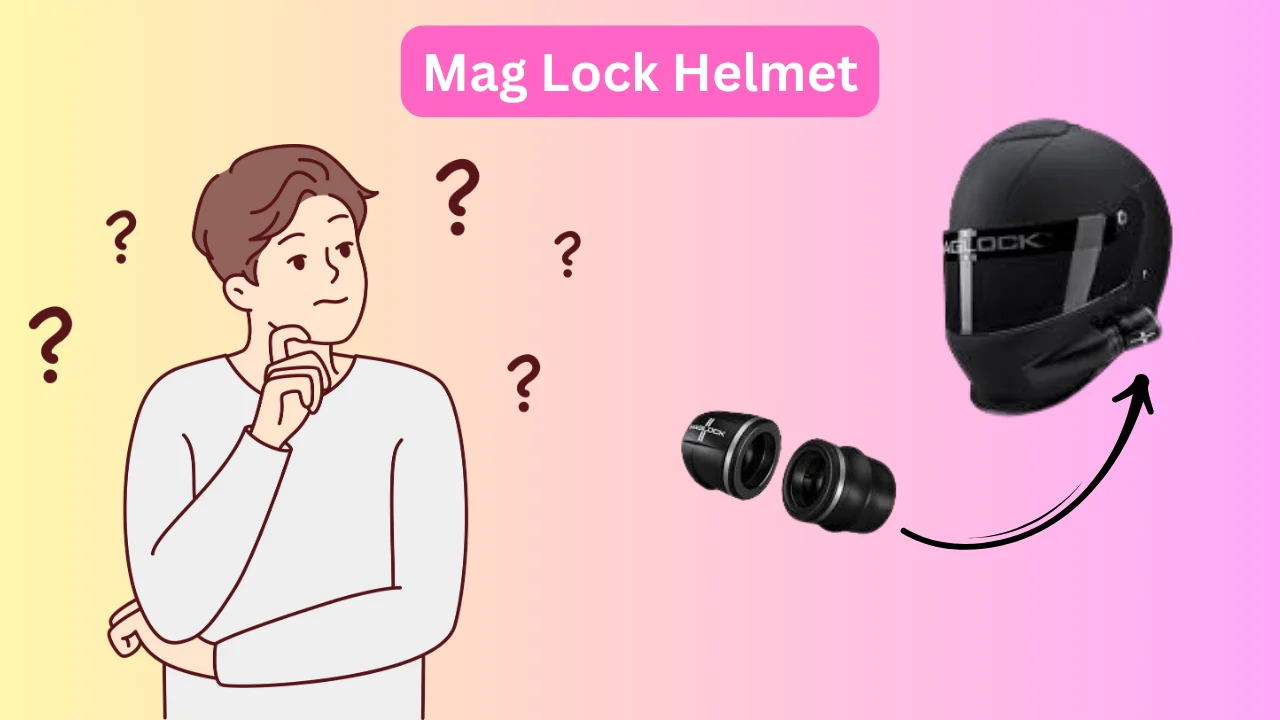When I first started thinking about getting a Bluetooth motorcycle helmet, I wasn’t worried about sound quality or battery life, I was worried about getting pulled over. I ride long distances, often with friends, and the idea of being able to talk to them, take calls, or hear GPS directions without fumbling with my phone sounded amazing. But then a thought hit me: Are Bluetooth Motorcycle Helmets Legal?
Some states have laws against wearing earphones while riding. I didn’t want to invest in a high-tech helmet only to find out I couldn’t legally use it. So, I went down a rabbit hole researching the rules, and now I’m sharing everything I learned so you don’t have to spend hours figuring it out yourself. Ready to upgrade your gear? Find trusted retailers and tips on where to get a motorcycle helmet.
What Exactly Is a Bluetooth Motorcycle Helmet?
Let’s keep it simple. A Bluetooth motorcycle helmet is just like a regular helmet but with built-in speakers and a microphone that connect wirelessly to your phone or other devices.

With it, you can:
- Talk to your passenger or other riders through an intercom system
- Hear GPS directions without looking at your phone
- Answer calls hands-free
- Listen to music or podcasts
The speakers are usually built into the helmet lining, so they don’t block your ears completely. That’s an important detail, and it’s one of the main reasons many states allow them.
Are Bluetooth Motorcycle Helmets Legal: Why Riders Care About Legality
For us bikers, staying legal is about more than avoiding fines. It’s about staying safe and keeping insurance valid. A Bluetooth helmet helps in real, everyday ways:
- Group rides become smoother, no more pulling over to discuss routes.
- Navigation is easier, GPS instructions mean fewer wrong turns.
- Emergencies are handled faster, you can call for help without removing your gloves or helmet.
But none of this matters if the law says you can’t use one where you ride. Thinking about Voss for your rides? Discover reviews and insights in are Voss helmets good before you decide.
How The Laws Work (And Why They’re Confusing)
Here’s where things get tricky. There’s no universal law about Bluetooth helmets. Every region has its own set of rules. Some states, provinces, or countries ban earphones and earbuds while riding, but make exceptions for helmet speakers. Others have strict conditions about how the Bluetooth unit is attached to the helmet.
I learned that there are three main things lawmakers care about:
- Helmet safety certification – Does the helmet meet local safety standards?
- Distraction risk – Will this device make you pay less attention to the road?
- Hearing ability – Can you still hear sirens, horns, and surrounding traffic?
Let’s break it down region by region.
United States
In the U.S., there’s no single federal rule about Bluetooth helmets. Each state has its own laws.
- Some states don’t care as long as your helmet meets DOT (Department of Transportation) standards. Look for a DOT sticker, that means it passed impact, penetration, and retention tests.
- States like Rhode Island, Virginia, Washington, and Florida specifically allow helmet speakers because they don’t sit inside your ear canal.
- Places like Colorado, Minnesota, and D.C. say you can only have a speaker in one ear.
- A few states have no clear rules, so you’re technically fine unless a police officer thinks you’re distracted.
My takeaway: In most U.S. states, if your helmet is DOT-approved and the speakers don’t block your ears, you’re good. But always check your own state’s motorcycle laws before buying.
European Union
In the EU, hands-free devices are generally allowed for motorcyclists. The main rule is that your helmet must meet UNECE 22.05 safety standards (changing to UNECE 22.06 soon).
The new 22.06 rule is interesting, it says you can’t drill holes to install a Bluetooth system unless it’s tested and approved with the helmet. That’s to make sure you’re not weakening the helmet’s structure.
France and Spain ban in-ear devices but allow built-in helmet systems. Curious if Ruroc helmets live up to the hype? Learn more at is Ruroc a good helmet.
United Kingdom
The UK is pretty straightforward, helmets must meet one of these:
- British Standard BS 6658:1985 (with the BSI Kitemark)
- UNECE 22.05
- An equivalent European standard
Bluetooth helmets are legal as long as they meet one of those standards.
Australia
In Australia, helmets must be approved under AS/NZS 1698 or UNECE standards. Bluetooth is fine, but you can’t drill into the helmet to install it yourself, it must be built-in or officially approved.
Other Regions
Asia, Africa, and Latin America all have mixed rules. Many countries follow European helmet standards, but some have no specific Bluetooth laws at all. Still, even in those places, police can fine you for distracted driving.
The Three Big Factors That Decide Legality
From everything I found, the law usually comes down to three things:
1. Helmet Certification
If your helmet doesn’t meet local safety standards, it’s illegal no matter what tech it has inside. That’s why I made sure mine had the right certification before even looking at Bluetooth features.
2. Distraction Risk
Even if Bluetooth is allowed, you can still be fined for distracted riding. I treat my helmet like my car’s hands-free system, if I need to do something more complicated than answering a call, I pull over.
3. Noise Levels
If you blast music so loud you can’t hear traffic, you could be fined in some areas. I keep my volume just high enough to hear but low enough to catch the sound of an ambulance. Want streamlined audio on your bike? See if motorcycle helmets have Bluetooth by checking here: do motorcycle helmets have Bluetooth.
Safety Tips I Follow With My Bluetooth Helmet
Since getting mine, I’ve built some habits that keep me safe and legal:
- Choose the right fit – I spent time finding a helmet that hugs my head without being uncomfortable. Loose helmets are dangerous in a crash.
- Learn the controls before riding – I practiced turning volume up and down and answering calls while parked.
- Keep calls short – I avoid long conversations and stay focused on the road.
- Check for wear and tear – If the straps are fraying or the padding feels loose, I replace it. If the helmet ever takes a hard hit, I replace it entirely.
Why This Is Especially Useful For Bikers
When you’re on a motorcycle, every decision happens fast. You don’t have the luxury of pulling over to check your phone for directions every five minutes. A Bluetooth helmet isn’t just about comfort, it’s about riding smarter.
Here’s how it’s changed my rides:
- On group trips, we can warn each other about road hazards instantly.
- When I’m touring unfamiliar places, GPS voice directions mean I can enjoy the scenery without worrying about getting lost.
- If my bike ever breaks down, I can call roadside assistance without removing my helmet or gloves.
My Personal Advice If You’re Thinking About Buying One
- Check your local laws first, don’t just assume because it’s legal somewhere else that it’s legal for you.
- Buy certified, only get helmets that meet your country’s safety standards.
- Go for built-in systems, they’re safer, cleaner, and more likely to be legal than DIY installations.
- Practice before hitting the road, the more you know your helmet’s controls, the less distracted you’ll be.
Final Thoughts
Bluetooth motorcycle helmets are legal in many places, but the details matter. In most regions, as long as the helmet meets safety standards and the speakers don’t block your ears, you’re fine. But rules can change, and distracted riding laws still apply no matter how advanced your helmet is.
For me, getting a Bluetooth helmet has made riding safer, more enjoyable, and a lot more connected. But it’s not just about tech, it’s about using it responsibly so you can focus on what matters most: the ride itself. Hope so, now you know the answer to: Are Bluetooth Motorcycle Helmets Legal? Brand matters for trust and safety. Evaluate if Ruroc is a good brand based on quality and performance.





